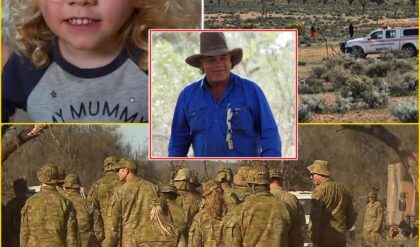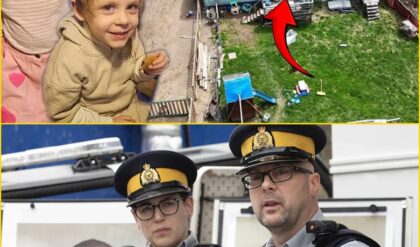The Indigenous tracker who joined the search for missing South Australian boy Gus Lamont has expressed quiet confidence that the child will eventually be found.
Monday marked a month since four-year-old Gus vanished from his grandparents’ remote Oak Park sheep station, about 43km south of Yunta.
Despite two major search operations involving SAPOL, Air Pol, the ADF and SES, hopes of finding the boy alive have faded.
The only sign of Gus was a footprint in the dust, believed to match the boots he was wearing when he disappeared at about 5.30pm while playing in a sandpile under his grandmother’s care.
Ronald Boland, a Port Augusta–based Aboriginal tracker and trapper, joined the early days of the search, which has since been called off, though investigations continue.
Speaking to the Daily Mail this week, Mr Boland said he remained certain Gus will be found.
He made the cryptic comment: ‘That little boy deserves respect to go about it on all the right roads.
‘Police will find him, they will. They do what they do best, I do what I do best.’ He added: ‘One day I will tell the story (about Gus).’

Indigenous tracker Ronald Boland joined police in the search for Gus Lamont after he vanished near Yunta in September

Mr Boland was seen on his green motorbike as he looked for clues

Gus, 4, disappeared while playing at the front of his grandparents’ homestead around 5pm
Gus lived on the station with his grandmother Shannon Murray, grandparent Josie Murray – a transgender woman, his mother Jessica and his younger brother Ronnie.
Gus’s father, Joshua Lamont, lives two hours away in Belalie North and is understood to be in a ‘commuter relationship’ with Gus and Ronnie’s mother.
Police do not suspect foul play and believe Gus likely wandered off into the twilight.
Mr Boland, 58, who has Nukunu, Narungga and Kokatha heritage, learned the ancient Indigenous art of tracking from a young age while growing up on Outback stations in South Australia.
During the search for Gus, police superintendent Mark Syrus described the tracker, identified by Daily Mail as Mr Boland, as having ‘a very good connection with the land here’.
‘He has worked on this property and knows it quite well,’ Supt Syrus said.
ABC News footage showed Mr Boland surveying the area from his green motorbike.
He declined to comment on the significance of the solitary red footprint found about 500m north of the Oak Park homestead, citing his close working relationship with SAPOL.

A solitary red footprint was found 500m north of the family home in the search’s early days

An aerial view of the remote homestead where Gus lived with his mum and grandparents
‘I’m keeping out of that,’ he said.
Mr Boland, whose day-to-day work involves tracking feral animals, has helped recover at least seven missing people throughout his long career.
He never ‘went to a school with four walls and a blackboard’ and explained that ‘my classroom was wide open spaces and my numbers and letters were human and animal tracks’.
Mr Boland, who learned tracking from his elders, lifted the veil on his fascinating and life-saving skill.
‘Not all people are cut out to be a tracker,’ he said.
‘An average person will follow a footprint and keep going as long as they see a visual track.
‘But a tracker has been taught to see and feel.
‘Humans are easier to track than animals – animals learn from a young age not to leave their tracks.

Gus’s parents, Jess Murray and Joshua Lamont, at the SA Music Awards in 2019

Gus’s grandparent Josie Murray was 10km away tending sheep when the little boy vanished
‘It’s a lot more than just looking for prints, we are more aware of our surroundings.’
Mr Boland – who founded company Tracks in the Sand – said his father Jeff Boland was a fence-builder for stations across South Australia and was a ‘well respected bushman’ who kept his kids out of trouble.
‘Whenever we got to a very remote job on a cattle station about 80km from the main homestead, he used to teach me and my brothers, “If you children ever get lost out here or wander away from my camp, I want you boys to remember what I am going to teach you”.
‘He passed on to me that if we got lost out bush, he said always look for that little zebra finch. He’s not far from water. Watch which way that sun comes up in the morning and watch where the sun sets in the evening.
‘(He said), “You must learn how to follow fresh cattle pads (prints) – they will lead you to a dam or water hole. If you come across an old road or a road that has been used a lot, stay on that road, I will find you. If you find a dam or waterhole with water in it, stay there – don’t move – me and my men will find you”.’
Mr Boland added, ‘Him and his men, old Aboriginal stockmen, taught us how to dig and find water in an old dry river bed when there is no water for miles.’
He admitted he feared his bushcraft was fading out.
‘The culture is dying. Young people are too focused on what’s on their phone and on the internet and aren’t looking at what’s around them,’ he said.

Mr Boland’s dad taught him to follow zebra finches to sources of water

Supt Mark Syrus revealed Mr Boland was familiar with the search area
‘And a lot of (Aboriginal) families used to live on stations but now they’ve all moved into the cities so there are less of us going bush.’
He said he honed his skills playing hide and seek with other children while growing up around Coober Pedy.
In a bid to prevent the world-famous art being lost, Mr Boland encouraged young people to join him so he can teach them his ways – just as elders did for him.
‘All my teaching was from Aboriginal people in the north of South Australia. I was taught the ways by those old traditional Aboriginal stockmen, that’s where all my skills come from,’ he said.
‘Sometimes there were up to 15 men in the camp mustering cattle, very kind men they were.
‘I am all about helping young Aboriginal people to gain employment and learning new skills, so taking them out bush with me is a good turning point in their lives. This field shows them there is life outside of the big towns and cities.’
In 1966, Aboriginal trackers Jimmy James and Daniel Moodoo famously rescued nine-year-old Wendy Pfeiffer in the Adelaide Hills after she had been missing for almost three days.
She had been stabbed three times and was left for dead by her attacker.
More than 150 police and volunteer searchers had failed to find her using modern methods.
SOURCE: https://www.dailymail.co.uk/news/article-15232773/Aboriginal-tracker-gus-lamont.html

